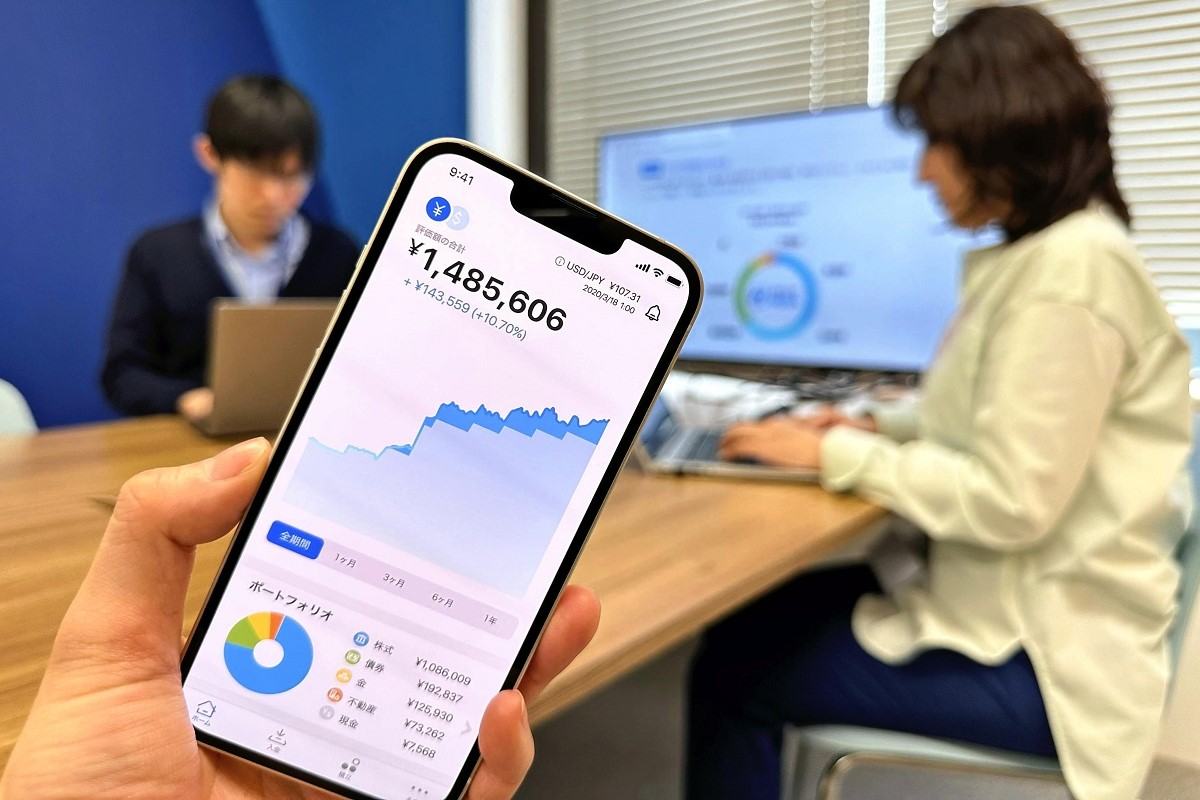
A smartphone screen shows a portfolio handled by a robo-advisor
20:00 JST, April 10, 2023
With interest rates remaining low, an increasing number of investors are entrusting their investment portfolios to robo-advisors, digital platforms that provide automated financial planning and investment services through artificial intelligence.
The total amount of assets deposited with major robo-advisory providers exceeded ¥1 trillion in 2022, but reliance on such platforms may result in unforeseen losses for users.
Robo-advisors propose and automatically manage financial products selected by AI or algorithms. They automatically invest in stocks, bonds, real estate and other assets depending on users’ income and intentions, such as whether they seek stable investments with low risk, or high-risk, high-yield investments.
According to the Japan Investment Advisers Association, total deposits with the five major robo-advisory firms reached ¥1.073 trillion as of December 2022. Industry-leading WealthNavi Inc. increased its balance by 13% from the end of 2021 to about ¥720 billion.
Risa Hayashi, 39, from Hiroshima Prefecture, started investing through WealthNavi 3½ years ago.
“I’m too busy with housework and childcare to check the market, so I’m happy to let the platform do all the work,” the office worker said.
As interest rates remain low and prices rise, asset management is becoming increasingly important. Interest in asset management is growing, as evidenced by the government’s expansion of the Nippon Individual Savings Account (NISA) investment scheme starting next year.
However, individuals often fail to gather sufficient information on financial products. According to the Japan Securities Dealers Association, as of the end of September 2022, nearly 90% of people who opened accounts for an installment-type NISA were inexperienced investors.
Robo-advisors have become a haven for beginners who are unfamiliar with investing.
However, the fees for robo-advisors are still high due to the cost of developing AI and algorithms. Trust fees for exchange-traded funds (ETFs) linked to the Nikkei share average are usually around 0.1%, but robo-advisors generally charge a fee of around 1% of the assets entrusted to them.
In addition, because robo-advisories entrust asset management to their respective programs, it is difficult for users to fully understand their portfolios. Even if losses occur, the reason may not be known.
“Robo-advisors alone are limited in their ability to respond to life plans [such as marriage and birth],” said Yasuki Okai, research director at Nomura Research Institute Ltd. “Users should look at other financial products and services as well.”
Top Articles in Business
-

Prudential Life Insurance Plans to Fully Compensate for Damages Caused by Fraudulent Actions Without Waiting for Third-Party Committee Review
-

Narita Airport, Startup in Japan Demonstrate Machine to Compress Clothes for Tourists to Prevent People from Abandoning Suitcases
-

Japan, U.S. Name 3 Inaugural Investment Projects; Reached Agreement After Considerable Difficulty
-

Toyota Motor Group Firm to Sell Clean Energy Greenhouses for Strawberries
-

SoftBank Launches AI Service for Call Centers That Converts Harsh Customer Voices into Softer Voices
JN ACCESS RANKING
-

Japan PM Takaichi’s Cabinet Resigns en Masse
-

Japan Institute to Use Domestic Commercial Optical Lattice Clock to Set Japan Standard Time
-

Israeli Ambassador to Japan Speaks about Japan’s Role in the Reconstruction of Gaza
-

Man Infected with Measles Reportedly Dined at Restaurant in Tokyo Station
-

Videos Plagiarized, Reposted with False Subtitles Claiming ‘Ryukyu Belongs to China’; Anti-China False Information Also Posted in Japan





















